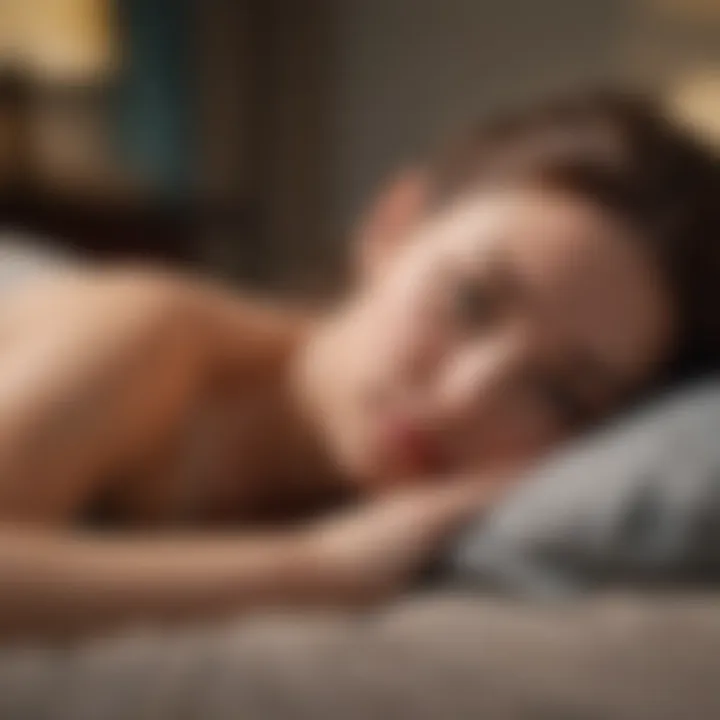Strategies to Fall Back Asleep After Drinking


Intro
Sleep disruptions can be quite troubling, especially after consuming alcohol. Many people enjoy socializing with drinks, yet they often face the consequence of a disrupted sleep cycle. Alcohol has a complex relationship with sleep, affecting its stages and overall quality. This article will examine the physiological effects alcohol has on sleep patterns, the challenges often encountered when trying to fall back asleep, and practical strategies to find peace in slumber once again.
Key Takeaways
- Alcohol's Impact on Sleep: Alcohol influences sleep quality by reducing REM sleep and altering sleep cycles.
- Challenges to Re-entering Sleep: After waking up post-drinking, heightened anxiety or discomfort may hinder the ability to fall asleep again.
- Effective Strategies: There are multiple methods to enhance the likelihood of returning to sleep, like creating a restful environment and practicing relaxation techniques.
It’s crucial to understand how alcohol affects our bodies and minds, and to recognize the steps we can take towards better sleep health.
Key Stats
- Studies indicate that about 30% of people report sleep disturbances after consuming alcohol.
- REM sleep is significantly reduced in individuals who drink heavily before bedtime.
Understanding Alcohol's Effect on Sleep
Alcohol may seem to induce sleepiness, but it has a paradoxical effect when considering overall sleep quality. It typically reduces the duration of REM sleep, which is vital for cognitive function and emotional regulation. This reduction can lead to grogginess and a lack of restorative rest.
Moreover, alcohol can often cause you to wake up during the night, pushing you into lighter sleep stages. Upon waking, you may experience heightened anxiety or discomfort due to dehydration or other physical symptoms of drinking. These feelings can complicate efforts to return to sleep.
Practical Tips
To enhance your chances of falling back asleep after waking from drinking, consider the following actionable steps:
- Adjust Your Environment: Keep your room dark, cool, and quiet. Consider blackout curtains and white noise machines to create a sleep-friendly atmosphere.
- Stay Hydrated: Drink a glass of water upon waking to help alleviate dehydration. However, avoid excessive liquid intake to prevent further disturbances.
- Relaxation Techniques:
- Limit Screen Time: Avoid screens from devices like phones or computers, as blue light can interfere with your ability to fall asleep.
- Meditation and Mindfulness: Short sessions can help ease your mind and foster a sense of relaxation, making it easier to drift off again.
- Gradual Return to Sleep: Instead of forcing sleep, allow yourself to lay quietly, embracing the stillness until you feel naturally inclined to doze off again.
- Try deep breathing exercises to calm your mind and body.
- Light stretches can help relieve tension.
Epilogue
Understanding how alcohol disrupts sleep patterns is vital for anyone who indulges in drinking. By employing effective strategies and making necessary adjustments to one’s environment and habits, individuals can improve their chances of falling back asleep after waking due to consumption of alcohol. This comprehensive approach provides not just short-term relief, but also sets the foundation for better sleep health in the long run.
Understanding Sleep Disruption from Alcohol
Understanding how alcohol disrupts sleep is crucial for those who consume it and want to maintain a healthy sleeping pattern. Alcohol is known to impact the body's natural sleep cycle significantly. When someone consumes alcohol, they often experience a reduction in overall sleep quality. This can complicate the ability to return to slumber after waking up, particularly if the individual has had a few drinks before bed.
Recognizing the mechanisms by which alcohol affects sleep not only helps in managing one’s consumption but also prepares individuals to deal with the consequences when they do drink. The physiological response to alcohol can lead to fragmented sleep and a shorter duration of restorative phases, which is essential for mental and physical recovery. Addressing these concerns can lead to better strategies for getting back to sleep after waking from drinking.
The Science of Alcohol and Sleep
The relationship between alcohol and sleep is complex. Research indicates that while alcohol can initially induce drowsiness, its long-term effects can disrupt sleep architecture.
Alcohol affects neurotransmitters that regulate sleep and wakefulness. For instance, it promotes the activity of GABA, a neurotransmitter that has calming effects and may help one fall asleep faster. However, these benefits are temporary.
According to various studies, alcohol consumption leads to decreased melatonin production, a hormone that is critical for sleep regulation. Consequently, this may cause disturbances later in the night. Moreover, as the body metabolizes alcohol, the rebound effect can cause an increase in alertness, leading to interruptions during sleep.
How Alcohol Affects Sleep Cycles
When looking at the effects on sleep cycles, it becomes apparent that alcohol primarily disrupts slow-wave sleep and REM sleep. Slow-wave sleep is crucial for physical restoration, while REM sleep plays a vital role in cognitive functions such as memory and learning.
- Slow-wave Sleep: Studies show that alcohol reduces the amount of time spent in deep sleep. This limitation can cause the body to lose out on the physical healing that occurs during these cycles.
- REM Sleep: Alcohol consumption is linked to shorter duration and distorting of REM episodes. This can lead to mood disturbances and cognitive deficits the following day.
In short, while alcohol may assist in the initial phases of falling asleep, it creates an inherent imbalance in the sleep cycle.
The Role of REM Sleep
REM sleep is a critical component of the sleep cycle. During this phase, the brain engages in intense activity. Dreams often occur in this state, and it is believed to be crucial for emotional regulation, learning, and memory.
Lack of adequate REM sleep can yield psychological impacts, including increased stress and anxiety, especially after a night of drinking. Individuals who drink heavily often report feelings of irritability and mood swings the next day, which can be attributed to insufficient REM sleep.


Additionally, disruptions in REM sleep can lead to a higher degree of grogginess upon waking, creating a vicious cycle of waking and struggling to return to deep slumber.
By understanding these nuances about sleep disruption due to alcohol, individuals can develop more effective strategies for overcoming these challenges and ultimately improve their sleep quality.
Identifying the Symptoms of Disrupted Sleep
Understanding how drinking alcohol disrupts sleep is essential to finding effective ways to mitigate its impact. Alcohol can lead to sleep interruptions that manifest both physically and mentally. Recognizing these symptoms can help a person take the appropriate steps toward recovery and restful sleep.
Common Experiences After Drinking
After consuming alcohol, many experience disruptions in their sleep pattern. Waking up in the middle of the night is common. This may be accompanied by difficulty falling back asleep. A person might recall vivid dreams or feel unrested, despite being in bed for several hours. These experiences often indicate that the quality of sleep has been compromised, rather than merely the quantity.
Alcohol intake may also lead individuals to feel excessively thirsty or have to go to the bathroom more frequently during the night. These experiences not only disturb sleep but also create a cycle of restlessness.
Physical Signs of Disturbed Sleep
Physical symptoms encountered after drinking can be quite varied. Some may notice signs like dry mouth or headaches. These are related to dehydration, a common effect of alcohol. Muscle tension is also a frequent complaint, as the body struggles to relax after a night of drinking.
Other potential signs include increased heart rate or sweating. Those who wake up might feel hot or cold, experiencing discomfort that keeps them alert. Recognizing these specific physical indicators is important. They serve as a clue that one needs to create a more conducive environment for sleep recovery.
Cognitive Impacts of Interrupted Sleep
The cognitive effects of interrupted sleep can be equally significant. After drinking, a person may find it hard to concentrate or focus during the day. Abnormal sleep patterns can lead to memory problems or a general feeling of mental fog. This can affect decision-making and productivity.
Moreover, anxiety and irritability may surface as a response to poor sleep quality. Such emotional reactions can perpetuate stress, which further compounds sleep issues. By identifying cognitive symptoms, one may realize the need for remedial strategies to improve sleep quality after a night of drinking.
Recognizing the symptoms of disrupted sleep enhances the ability to implement targeted strategies for recovery, ultimately leading to better overall health.
Through understanding these symptoms, individuals can become more aware of their bodies' responses post-alcohol, guiding them toward effective strategies that promote restful sleep and overall wellness.
Tips to Facilitate Return to Sleep
After waking up from a night's sleep interrupted by alcohol, many individuals find it challenging to drift back into slumber. This section delves into practical strategies aimed at easing the path back to sleep. Employing these tips can help foster an environment and mindset conducive to restful sleep.
Creating a Restful Environment
The sleep environment plays a crucial role in one's ability to fall back asleep. An optimal sleep setting includes several elements.
- Darkness: Ensure the room is as dark as possible. Use blackout curtains or eye masks to block out any light.
- Temperature: The ideal temperature for sleep usually falls between 60 to 67 degrees Fahrenheit (15 to 20 degrees Celsius). Adjust the thermostat or use extra blankets as needed.
- Noise Control: Silence is vital for sleep. If complete quietude is not achievable, consider using white noise machines or earplugs.
- Comfortable Bedding: Invest in quality pillows and mattresses. Your body should feel supported and relaxed.
- Declutter: A tidy space can enhance relaxation. A cluttered environment may lead to stress and distraction.
By aligning your environment with these recommendations, you can significantly improve your chances of falling back asleep.
Utilizing Relaxation Techniques
Integrating relaxation techniques into your routine can facilitate a smoother transition back to sleep. These methods can be practiced in the bed, promoting calmness and reducing anxiety.
- Progressive Muscle Relaxation: This technique entails tensing and then relaxing each muscle group, starting from your toes and advancing to your head. It enhances body awareness and induces relaxation.
- Guided Imagery: Visualizing serene scenes or peaceful experiences can distract the mind from stress and promote tranquility.
- Gentle Stretching: Engaging in light stretches can release tension built up during the day. Focus on movements that feel good and do not require too much energy.
Promoting relaxation paves the way for restorative sleep and can aid in overcoming the disruptions caused by alcohol consumption.
Breathing Exercises for Sleep
Breathing exercises serve as an effective, immediate tool to help calm the mind and body. They can be done discreetly and do not require special equipment.
- Diaphragmatic Breathing: Inhale deeply through the nose, allowing your abdomen to expand. Hold for a moment, then exhale slowly through your mouth. This is beneficial for reducing stress.
- 4-7-8 Breathing: Inhale for four seconds, hold the breath for seven seconds, and exhale for eight seconds. This method promotes relaxation and can help manage anxiety.
- Counted Breaths: Focus on your breath by counting each inhale and exhale. This simple act can serve as a mental distraction from disruptive thoughts.
Incorporating breathing practices into your night routine can significantly help in calming racing thoughts, ultimately easing the way back to sleep.
"Creating a peaceful environment and utilizing relaxation techniques are vital steps for those struggling to regain sleep after drinking. These practices can aid in restoring the balance needed for restful slumber."


By employing these strategies, individuals can find a pathway back to sleep, improving overall sleep quality while counteracting the negative effects of alcohol.
The Importance of Sleep Hygiene
Establishing effective sleep hygiene can lead to several key benefits. First, it helps enhance sleep quality. By maintaining a regular sleep routine, the body learns when to wind down and when to wake up. A predictable sleep pattern can make it easier to transition back to sleep after waking. Second, good hygiene reduces the likelihood of insomnia and other sleep disorders over time, especially in the context of alcohol intake. Following a plan can significantly minimize the negative impact of alcohol on sleep.
In addition, practicing good sleep hygiene can help stabilize mood and improve overall well-being. When sleep is consistent and restful, individuals tend to feel more alert and energized throughout the day. This can counteract some effects of alcohol that can linger after consumption, like fatigue and irritability. Therefore, integrating good habits into daily life is a practical approach for those aiming to regain sleep following drinking.
Here are several elements to consider when focusing on sleep hygiene:
- Establish a bedtime routine: A calming routine signals your body that it is time to sleep. This may include reading, meditating, or light stretching.
- Create an optimal sleep environment: Ensure your bedroom is dark, quiet, and at a comfortable temperature to facilitate better sleep.
- Be mindful of food and drink intake: Avoid eating heavy meals and consuming caffeine close to bedtime. Alcohol can disrupt sleep patterns, so it's best to manage its consumption.
By recognizing the elements of sleep hygiene and implementing them effectively, individuals can improve their chances of falling back asleep after waking from alcohol-related disturbances.
"Sleep hygiene is not just about how you sleep; it’s about setting the stage for all the hours leading up to sleep as well."
Implementing these practices can lead to more restful and uninterrupted sleep, especially in the context of post-drinking recovery.
Diet and Sleep Recovery
Diet plays a pivotal role in sleep recovery, particularly after nights of drinking. When alcohol is consumed, it disrupts sleep architecture and can lead to insufficient restorative sleep. The right dietary choices made after drinking can mitigate these effects and improve the chances of returning to restful slumber.
Food not only influences how we feel physically but also how we sleep psychologically. After drinking, the body craves certain nutrients to aid recovery and restore balance. This section will delve into the specific elements of diet that affect sleep quality.
The Impact of Food Choices on Sleep Quality
Food choices are significant when it comes to sleep quality after consuming alcohol. Foods rich in certain nutrients can help counteract the sedative effects caused by alcohol. For example, nutrient-rich foods like complex carbohydrates, lean proteins, and fruits can aid in regulating neurotransmitters in the brain.
- Complex Carbohydrates: Foods like whole-grain bread, brown rice, and oats can increase the availability of tryptophan, which is a precursor to the sleep hormone melatonin.
- Lean Proteins: Incorporating chicken, fish, or tofu into a post-drinking meal can also help facilitate the production of neurotransmitters necessary for sleep.
- Fruits and Vegetables: These foods are high in fiber and valuable vitamins. Bananas, cherries, and spinach are good examples, as they also provide magnesium and potassium, contributing to muscle relaxation.
Considerations around food timing are crucial as well. Eating too close to bedtime can lead to discomfort and hinder the ability to fall back asleep. Planning a post-drink snack that includes these beneficial elements at least an hour before attempting to sleep can enhance recovery.
Hydration Considerations Post-Drinking
Hydration is another critical factor when it comes to recovering sleep after drinking. Alcohol is a diuretic, which means it can lead to dehydration. Dehydration has a well-known impact on sleep, causing disruptions and increased wakefulness.
After drinking, drinking adequate water is essential. However, the choice of hydration agents can also help.
- Water: The most straightforward and effective means to rehydrate the body.
- Electrolyte Drinks: Beverages enriched with electrolytes such as potassium and sodium can assist in restoring balance, especially after significant alcohol consumption. Brands like Pedialyte or coconut water can be helpful.
- Herbal Teas: Chamomile or peppermint teas can soothe the stomach while promoting relaxation. These can be particularly effective when consumed an hour or so before bed.
"Hydration not only helps the body recover but also plays a fundamental role in sleep quality after alcohol consumption."
Being mindful of these dietary choices can enhance post-alcohol recovery. Choosing the right foods and maintaining proper hydration can create conducive conditions for a return to sleep after awakening.
Adopting Mindfulness Practices
Adopting mindfulness practices can significantly enhance one’s ability to return to sleep after waking from drinking. These practices focus on the importance of being present and aware, reducing the mental chatter that often disrupts sleep. By incorporating mindfulness into one’s routine, individuals can develop better emotional regulation and relaxation skills. This becomes even more essential after alcohol consumption, which disrupts sleep cycles. Mindfulness techniques help in creating a calm mental state, making it easier to transition back to sleep.
Meditation Techniques for Better Sleep
Meditation serves as a powerful tool for promoting sleep quality, especially after the disturbances caused by alcohol. Different techniques can be utilized to foster a peaceful mindset. For instance, guided meditations that focus on relaxation can help clear the mind. Setting an intention to relax before going to sleep can create a conducive environment for better rest.
Here are some techniques to consider:
- Mindfulness Meditation: Focus on your breath and observe your thoughts without judgment. This can help reduce feelings of anxiety and stress.
- Body Scan Meditation: This involves mentally scanning each part of your body, from head to toe, focusing on areas of tension and consciously relaxing them.
- Visualization: Imagine a peaceful scene, such as a calm beach, to facilitate a relaxed mental state.
Practicing these meditation techniques can significantly assist in lowering heart rates and calming the nervous system, preparing the body for sleep.
Gentle Yoga for Relaxation


Engaging in gentle yoga can be a beneficial practice for enhancing sleep after waking. Yoga not only helps to physically relax the body but also calms the mind. Gentle stretches and breathing practices can ease physical tension that may linger after drinking.
Consider incorporating the following yoga routines:
- Child's Pose: This resting pose promotes relaxation. It encourages deep breathing and provides a gentle stretch for the back.
- Cat-Cow Stretch: This movement sequence can alleviate tension in the spine and help in reducing feelings of anxiety.
- Forward Bend: This pose encourages a calming effect, promoting relaxation of the mind and body, making it easier to drift back to sleep.
In tandem with mindful breathing, these gentle yoga practices create a deeper sense of body awareness and relaxation, which can have a positive impact on the ability to return to sleep after waking up. Adopting mindfulness through meditation and gentle yoga can establish a more restful state, thus improving overall sleep health.
Seeking Professional Help
In the realm of sleep disturbances, especially those linked to alcohol consumption, understanding when to seek professional intervention is crucial. While many might initially dismiss their symptoms as typical after a night of drinking, persistent issues may signal an underlying sleep disorder or dependency on alcohol. Seeking help can facilitate a tailored approach to sleep recovery. It opens doors to a nuanced understanding of individual sleep patterns, enabling the identification of specific triggers that might impede restful slumber.
Professional assistance can provide patients not only with clarity but also with effective coping strategies. Sleep specialists can conduct sleep studies to objectively measure sleep cycles, identify irregularities, and suggest personalized methodologies for achieving deeper rest. This becomes especially relevant when traditional at-home methods fail to yield significant improvements.
Benefits of Seeking Professional Help
- Comprehensive assessment of sleep patterns
- Personalized treatment plans
- Assistance in understanding psychological aspects related to alcohol use
- Access to therapies and interventions not commonly explored
For health professionals, wellness coaches, and similar practitioners, referring clients to specialists emphasizes a collaborative effort in promoting better overall health. It signals that one cares about the deeper issues contributing to the symptoms the clients experience.
"The path to successful sleep recovery often requires expert insight and support that goes beyond personal attempts."
While every case is unique, some of the signs indicating the necessity for consulting a sleep expert may include:
- Frequent awakenings during the night
- Difficulty returning to sleep after waking
- Daytime fatigue or excessive sleepiness
- Increased reliance on alcohol as a sleep aid
- Complaints of insomnia that do not dissipate over time
Understanding these symptoms can propel individuals toward effective resolutions through professional help.
When to Consult a Sleep Specialist
Deciding to consult a sleep specialist often arises from recognizing the symptoms chronicled earlier. If an individual experiences sleep disturbances regularly after alcohol consumption, and these impacts result in daily dysfunction, it’s essential to seek an expert's opinion. The duration of symptoms matters, as persistent issues lasting beyond a few weeks warrant attention. Additionally, co-occurring conditions such as anxiety or depression may complicate matters, making professional consultation even more vital.
Key indicators for consultation include:
- Sleep issues that worsen despite lifestyle adaptations
- Unexplained sleep behaviors such as snoring or acting out dreams
- The feeling that alcohol no longer aids sleep but disrupts it
Early intervention is often the key to prevention and successful treatment of potential disorders. Delay in addressing sleep issues can exacerbate the underlying causes, leading to more severe long-term consequences.
Therapies for Sleep Disorders
When consulting a specialist, various therapies may be proposed based on individual assessments. These therapies aim to address both the direct impacts of alcohol on sleep and the broader implications of sleep disorders. Commonly employed modalities include:
- Cognitive Behavioral Therapy for Insomnia (CBT-I): This structured program addresses the thoughts and behaviors that contribute to sleep issues, notably useful for those whose sleep troubles stem from behavioral patterns.
- Medication Management: Pharmacological assistance can sometimes be necessary. Drugs may help to regulate sleep cycles, but their use requires careful oversight due to potential dependency, particularly in individuals with a history of alcohol use.
- Sleep Restriction Therapy: This approach limits time in bed to match actual sleep, thereby strengthening the sleep drive.
By pursuing this professional support, individuals can achieve more reliable sleep patterns. Proper therapist selection and commitment to suggested therapies play a pivotal role in recovery success. Ultimately, seeking professional help is a significant step toward restoring sleep quality and overall health.
Long-Term Strategies for Sleep Improvement
Long-term strategies for sleep improvement are crucial for those who find their sleep patterns disrupted by alcohol consumption. Establishing healthy sleep habits and understanding the nuances of alcohol tolerance can significantly enhance sleep quality. Developing sustainable practices helps ensure that episodes of sleeplessness do not become a recurring theme. This section will examine the importance of building reliable sleep routines and recognizing individual responses to alcohol, ultimately empowering readers to forge pathways towards more restful nights.
Building Healthy Sleep Habits
Building healthy sleep habits requires mindful intention and consistency. Here are several recommendations that can create a foundation for better sleep:
- Consistent Sleep Schedule: Going to bed and waking up at the same time each day primes the body’s internal clock, supporting better sleep cycles.
- Sleep-Inducing Environment: A dark, quiet, and cool bedroom promotes relaxation. Consider using blackout curtains, earplugs, or white noise machines.
- Limit Naps: While short naps can be rejuvenating, long or irregular napping can interfere with nighttime sleep. If needed, keep naps under 30 minutes.
- Establish a Pre-Sleep Routine: Engaging in calming activities such as reading or gentle stretching can signal to the body that it is time to wind down.
By integrating these healthy sleep habits into daily life, individuals can create a conducive sleep environment that minimizes disruptions caused by alcohol.
Understanding Alcohol Tolerance and Sleep Patterns
Understanding how alcohol tolerance affects sleep is vital for developing an informed approach. Not all individuals metabolize alcohol the same way, leading to different effects on sleep. Some key points include:
- Individual Differences: Factors such as body weight, metabolism rate, and drinking frequency play a role in how alcohol affects sleep patterns. Be mindful of these variances.
- Tolerance Development: Over time, repeated alcohol consumption may lead to tolerance, which can alter natural sleep architecture and reduce overall sleep quality.
- Sleep Disturbances: Even if one feels they have adapted to alcohol, it can still impact sleep quality. Individuals may find themselves waking up in the middle of the night or experiencing a lighter sleep phase.
Understanding these elements can equip individuals with the necessary knowledge to make informed decisions regarding alcohol consumption and its overall impact on their sleep quality.
"Improving sleep is a gradual process, requiring commitment and awareness of personal habits. Only through consistent practice can one achieve sustainable sleep health."







